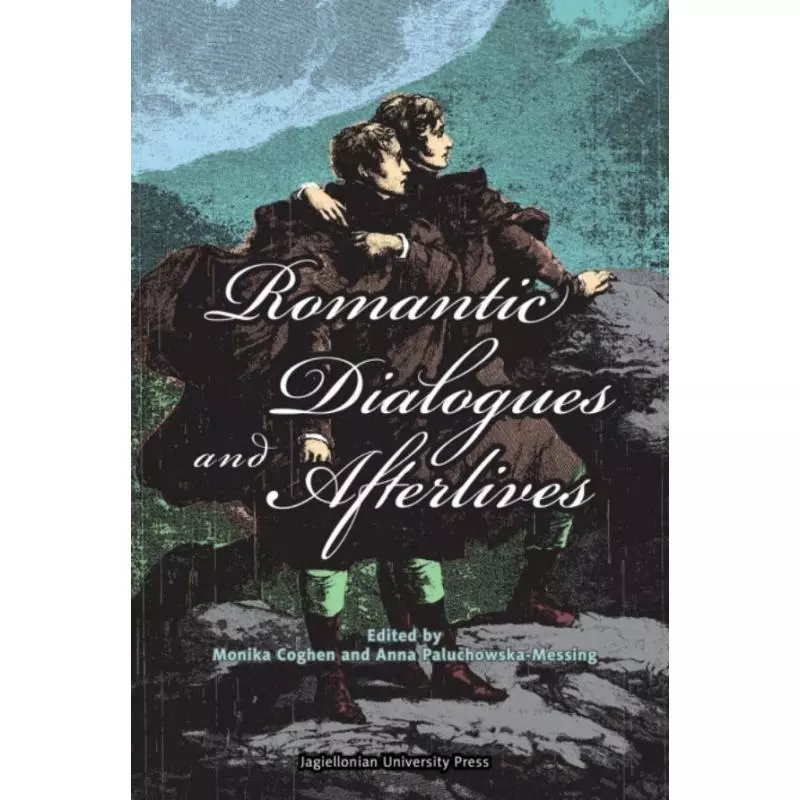
search
Udostępnij

Wydawnictwo Uniwersytetu Jagiellońskiego
9788323349204
23.5 x 15.5
350
Angielski
miękka
Romantic writers often asserted their individuality, but this assertion tended to take the form of positioning themselves in relation to other authors and literary texts. Thus they implicitly acknowledged the rich network of broadly understood poetic dialogue as an important and potent source for their own creativity. When in 1816 John Keats wrote “Great
Romantic writers often asserted their individuality, but this assertion tended to take the form of positioning themselves in relation to other authors and literary texts. Thus they implicitly acknowledged the rich network of broadly understood poetic dialogue as an important and potent source for their own creativity. When in 1816 John Keats wrote “Great spirits now on earth are sojourning,” he celebrated the originality of his contemporaries and the historical significance of his times, pointing to deep interest in “the hum of mighty works” in all the fields of human activity, to which “the nations” ought to listen. Keats’s sonnet suggests not only stimulating exchanges between poets, artists and social thinkers in the same language, but also the idea of transnational appreciation and dialogue.
The volume takes up this idea and explores the dialogues of Romantic authors within the wide scope of European and American cultures. Essays by scholars from Germany, Britain, Bulgaria, Poland, Canada and the United States of America examine Romantic writers’ responses to their contemporaries, explore their dialogues with the culture of the past, and their interactions across the arts and sciences. They also scrutinize the Romantics’ far-reaching influence on later writers and artists, and thus extend the network of artistic exchange to modern times. The volume offers a rich tapestry of interconnections that span across time and space, interlace languages and cultures, and link Romantic writers and artists with their predecessors and successors across Europe and America. The essays in the collection invite the reader to join ongoing dialogues between writers and their audiences, of the past and present.
Monika Coghen is a faculty member at the Institute of English Studies of the Jagiellonian University in Kraków. She has worked on British Romanticism, and Anglo-Polish cultural relations in the eighteenth and nineteenth centuries. She has published numerous articles on British Romantics and the Gothic, and on the reception of British Romantic literature in Poland.
Anna Paluchowska-Messing is a faculty member at the Institute of English Studies of the Jagiellonian University in Kraków. She has published on Frances Burney, Hannah Cowley and Mary Wollstonecraft, and her research interests circle round the relationships between the novel and drama in the long eighteenth century, and on authorial self-representations in the period. Her book Frances Burney and Her Readers: The Negotiated Image was published in 2020.
__________________________________________________
Romantyzm zwykle kojarzy się z samotnym geniuszem, z poetą usytuowanym na obrzeżach społeczeństwa i podkreślającym swoją twórczą niezależność. Pisarze romantyczni często kreowali taki właśnie wizerunek, wchodząc przy tym nieuchronnie w swoisty dialog z innymi twórcami i myślicielami, zarówno sobie współczesnymi, jak i z poetami z przeszłości lub ze swymi przewidywanymi odbiorcami i następcami. Tak właśnie szeroko pojęty romantyczny dialog jest głównym tematem esejów badaczy z Polski, Niemiec, Wielkiej Brytanii, Bułgarii, Kanady i Stanów Zjednoczonych. Artykuły zawarte w tym tomie rzucają nowe światło na wzajemne oddziaływanie pisarzy romantyzmu europejskiego i amerykańskiego, ich związki z literaturą klasyczną, a także na ich spuściznę i wpływy na późniejszych twórców, również tych najbardziej współczesnych. Książka zachęca tym samym czytelnika do włączenia się w stymulującą wymianę myśli oraz do spojrzenia na nowo na tę wyłaniającą się podczas lektury wielowymiarową sieć powiązań między różnymi kulturami, językami, wizjami świata oraz pomiędzy teraźniejszością, przeszłością i przyszłością.
Monika Coghen jest literaturoznawczynią w Instytucie Filologii Angielskiej Uniwersytetu Jagiellońskiego. Zajmuje się głównie brytyjską literaturą osiemnastego i dziewiętnastego wieku oraz polsko-angielskimi interakcjami literackimi i kulturowymi. Opublikowała szereg artykułów o dramacie angielskiego romantyzmu i gotycyzmie oraz recepcji literatury angielskiej w Polsce.
Anna Paluchowska-Messing prowadzi badania w Instytucie Filologii Angielskiej Uniwersytetu Jagiellońskiego w Krakowie. Zajmuje się literaturą i kulturą angielską osiemnastego i dziewiętnastego wieku, a w szczególności związkami między powieścią i dramatem oraz sposobami twórczej autoprezentacji pisarek angielskich tego okresu. Jest autorką książki Frances Burney and Her Readers: The Negotiated Image, która ukazała się w 2020 roku.

POŚPIESZ SIĘ OSTATNI EGZ. Mamy na stanie, wysyłamy od razu.
Darmowa dostawa już od 100 zł
Zamów tel.: tel.: 508768309 (Kamila)
Pon. – Pt. 8:00 – 15:00





